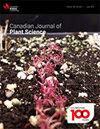研究了不同种子处理对加拿大大西洋地区常规大豆经济最佳播种率的影响
IF 1
4区 农林科学
Q3 AGRONOMY
引用次数: 0
摘要
摘要加拿大大西洋地区阴凉生长环境下的大豆播种率远高于其他地区,影响经济效益。最近在北美进行的研究表明,大豆播种率可以降低,以实现利润最大化。种子处理已被证明可以提高非生物胁迫的耐受性,这可能是另一种降低出苗率的机制。因此,本研究的目的是(i)确定加拿大大西洋地区传统大豆的经济最佳播种率(EOSR), (ii)确定杀菌剂种子处理是否可以降低这一比率。在2020年和2021年进行了实地研究,评估了四种播种率和四种杀菌剂种子处理对大豆林分建立、生长、资源利用效率、产量和盈利能力的影响。收到的价格对生产者的回报和EOSR产生了巨大影响,其范围从低价格收到情景下的243000种子ha - 1 (0.45 kg - 1美元)到高价格收到情景下的613000种子ha - 1 (0.82 kg - 1美元)。相比之下,种子和农药成本对预期收益的影响微乎其微。大豆资源利用效率不受播量和种子处理的影响。进一步的种子处理不影响大豆林分建立或盈利能力。大豆产量随播种量的增加而增加,并在播种量为74.1万粒ha - 1时趋于平稳,单株产量随播种量的增加而急剧下降。这项研究的结果表明,加拿大大西洋地区的大豆生产者应该根据合同价格或预期价格来确定播种率,以实现利润最大化。本文章由计算机程序翻译,如有差异,请以英文原文为准。
Investigating the effects of seed treatments on the economically optimal seeding rate of conventional soybean in Atlantic Canada
Abstract Soybean seeding rates in the cool growing environment of Atlantic Canada are much higher than other regions impacting economic return. Recent studies across North America have suggested that soybean seeding rates can be lowered to maximize profitability. Seed treatments have been shown to improve abiotic stress tolerance and may be another mechanism to reduce seeding rates. Therefore, the objectives of the present study were to (i) determine the economically optimal seeding rate (EOSR) for conventional soybean in Atlantic Canada and (ii) determine if fungicide seed treatments can reduce this rate. Field studies were conducted in 2020 and 2021 to evaluate the effects of four seeding rates and four fungicide seed treatments on soybean stand establishment, growth, resource use efficiency, yield, and profitability. Price received had a dramatic effect on producer return and the EOSR which ranged from 24 3000 seeds ha−1 under a low price received scenario ($0.45 kg−1) up to 613 000 seeds ha−1 under a high price received scenario ($0.82 kg−1). In contrast, seed and pesticide costs had a minimal impact on expected returns. Soybean resource use efficiency was not impacted by seeding rate or by seed treatments. Further seed treatments did not impact soybean stand establishment or profitability. Soybean yield increased with seeding rate and plateaued at a seeding rate of 741 000 seeds ha−1, whereas individual plant yield dramatically declined as seeding rate increased. Results of this study suggest that soybean producers in Atlantic Canada should base their seeding rates on contracted or expected price received to maximize profitability.
求助全文
通过发布文献求助,成功后即可免费获取论文全文。
去求助
来源期刊
CiteScore
1.90
自引率
8.30%
发文量
91
审稿时长
1 months
期刊介绍:
Published since 1957, the Canadian Journal of Plant Science is a bimonthly journal that contains new research on all aspects of plant science relevant to continental climate agriculture, including plant production and management (grain, forage, industrial, and alternative crops), horticulture (fruit, vegetable, ornamental, greenhouse, and alternative crops), and pest management (entomology, plant pathology, and weed science). Cross-disciplinary research in the application of technology, plant breeding, genetics, physiology, biotechnology, microbiology, soil management, economics, meteorology, post-harvest biology, and plant production systems is also published. Research that makes a significant contribution to the advancement of knowledge of crop, horticulture, and weed sciences (e.g., drought or stress resistance), but not directly applicable to the environmental regions of Canadian agriculture, may also be considered. The Journal also publishes reviews, letters to the editor, the abstracts of technical papers presented at the meetings of the sponsoring societies, and occasionally conference proceedings.

 求助内容:
求助内容: 应助结果提醒方式:
应助结果提醒方式:


